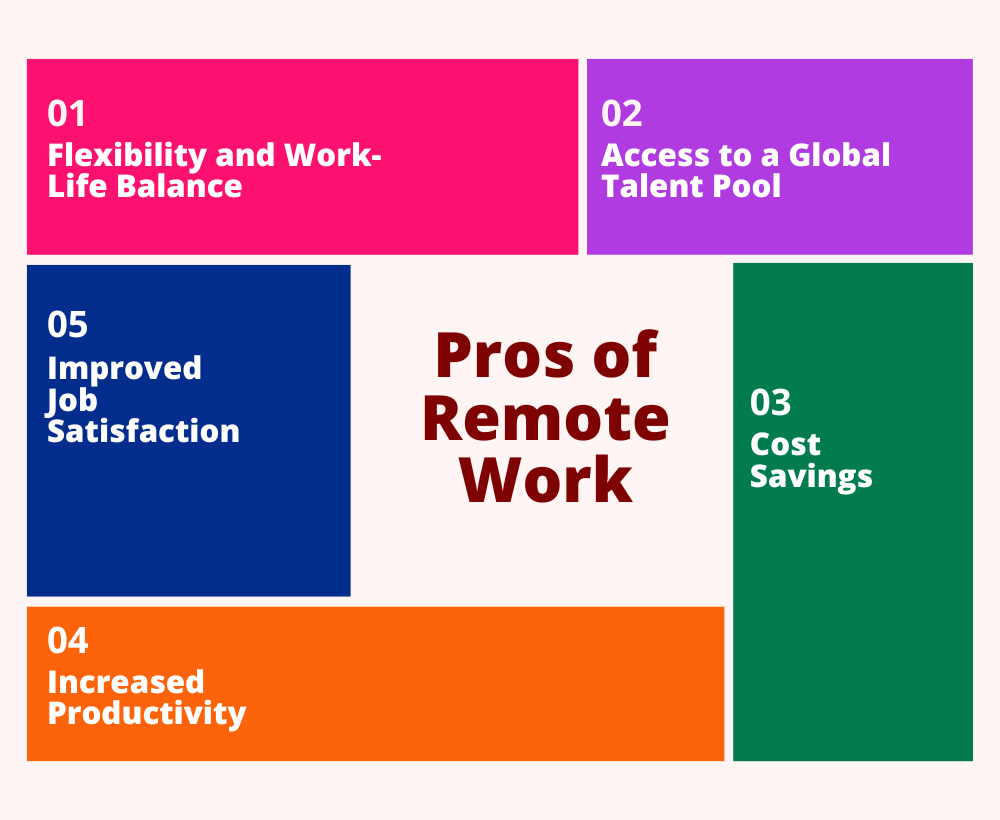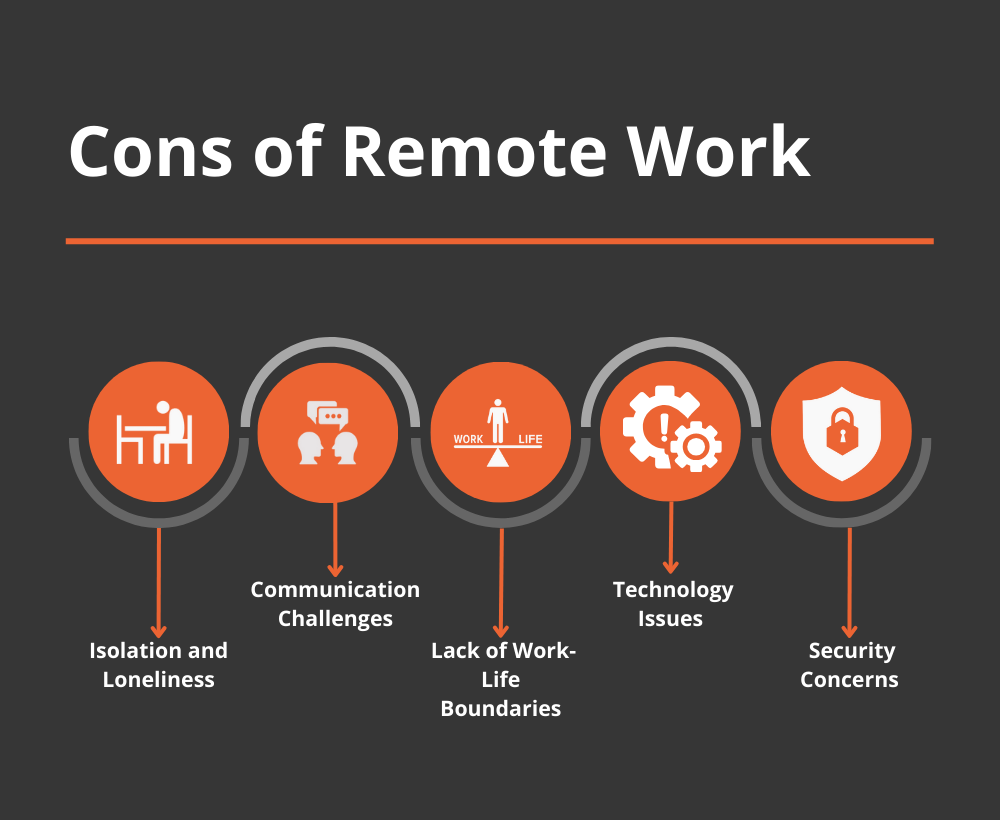
In recent years, remote work has become a buzzword in the professional world. The rise of technology and the changing landscape of work have made it increasingly feasible for employees to work from the comfort of their own homes or anywhere else with an internet connection. While this shift towards remote work has undoubtedly brought about numerous benefits, it has also introduced its own set of challenges. In this blog, well explore the pros and cons of remote work, shedding light on the complexities and opportunities this evolving work model presents.
Pros of Remote Work

1. Flexibility and Work-Life Balance
One of the most significant advantages of remote work is the flexibility it offers. Employees can often set their own schedules, allowing them to better balance their professional and personal lives. This flexibility can lead to increased job satisfaction and reduced stress levels, ultimately benefiting both employees and employers.
Remote work also eliminates the need for lengthy commutes, saving employees valuable time and reducing their environmental footprint. This newfound freedom allows individuals to spend more time with their families, pursue hobbies, or simply relax and recharge.
2. Access to a Global Talent Pool
Remote work opens the door to a global talent pool. Companies are no longer limited to hiring talent within their immediate geographic area. This expanded reach enables organizations to tap into a diverse range of skills and experiences, fostering innovation and creativity within their teams.
3. Cost Savings
For both employees and employers, remote work can translate into cost savings. Employees save money on commuting, work attire, and daily meals. Employers can reduce expenses related to office space, utilities, and other overhead costs. This cost-efficiency can be particularly advantageous for startups and small businesses.
4. Increased Productivity
Studies have shown that remote workers can be more productive than their in-office counterparts. Reduced distractions, fewer office politics, and the ability to create a personalized work environment contribute to this boost in productivity. Additionally, remote work allows employees to choose the work conditions that best suit their needs, further enhancing their efficiency.
5. Improved Job Satisfaction
Remote work often results in higher job satisfaction. Employees appreciate the trust and autonomy given to them by their employers. This positive work experience can lead to increased loyalty and lower turnover rates, ultimately benefiting companies in the long run.
Cons of Remote Work

1. Isolation and Loneliness
While remote work provides flexibility, it can also lead to feelings of isolation and loneliness. The absence of face-to-face interactions with colleagues can lead to a sense of disconnection from the team and the organisations culture. Isolation can also impact mental health, potentially leading to anxiety and depression.
2. Communication Challenges
Effective communication is crucial in any workplace, and remote work can present challenges in this regard. Misunderstandings and misinterpretations may occur more frequently when relying solely on digital communication tools. Video conferences and chat platforms can never fully replicate the nuances of in-person conversations.
3. Lack of Work-Life Boundaries
While remote work can enhance work-life balance, it can also blur the boundaries between work and personal life. Without a clear separation between the two, employees may find it difficult to disconnect from work, leading to burnout and decreased productivity.
4. Technology Issues
Remote work heavily relies on technology, and technical issues can disrupt productivity. Internet outages, software glitches, and hardware failures can be frustrating and time-consuming, impacting both employees and employers.
5. Security Concerns
Remote work introduces cybersecurity risks. When employees access company data from various locations and devices, it can be challenging to maintain a high level of data security. Companies must invest in robust cybersecurity measures to protect sensitive information.
Balancing the Pros and Cons of Remote Work
The pros and cons of remote work paint a nuanced picture of this evolving work model. It is essential for both employers and employees to strike a balance that maximises the advantages while mitigating the drawbacks. Here are some strategies to help achieve this balance:
1. Clear Communication
To address communication challenges, companies should establish clear communication protocols. Regular check-ins, video meetings, and the use of collaboration tools can help bridge the gap between remote team members.
2. Set Boundaries
Both employers and employees must set clear boundaries between work and personal life. Establishing a dedicated workspace and sticking to a regular work schedule can help maintain a healthy work-life balance.
3. Embrace Technology Responsibly
To minimize technology-related disruptions, invest in reliable hardware and software, and ensure employees have access to IT support when needed. Regular software updates and cybersecurity training can also enhance security and productivity.
4. Prioritise Mental Health
Employers should prioritize the mental health and well-being of remote employees. Offering resources such as mental health support, virtual team-building activities, and flexible work hours can help combat feelings of isolation and burnout.
5. Evaluate Performance Objectively
Rather than micromanaging remote employees, focus on evaluating performance based on outcomes and results. Trusting employees to manage their work efficiently can boost morale and productivity.
| Latest Category Jobs | ||
|---|---|---|
| Job Information | Apply Job | |
Application Developer(3-5 years) | ||
Full Stack Developer(3-5 years) | ||
SAP Sales and Distribution (SD)(5-12 years) | ||
Application Developer: Cloud FullStack(0-1 years) | ||
Java Full Stack Development(12-15 years) | ||
Management Trainee(2-3 years) | ||
Conclusion
In conclusion, the pros and cons of remote work highlight the multifaceted nature of this work model. Remote work offers flexibility, access to global talent, and cost savings, but it can also lead to feelings of isolation, communication challenges, and blurred work-life boundaries. To successfully embrace remote work, organisations and individuals must recognize these pros and cons and implement strategies to harness the benefits while addressing the drawbacks. Ultimately, remote work is not a one-size-fits-all solution, but with careful planning and adaptation, it can indeed be a valuable and sustainable option for the future of work. So, if youre considering remote work, be prepared to weigh the pros and cons, find your own balance, and embrace the opportunities it can bring to your professional and personal life. Remote work is here to stay, and by understanding and managing its challenges, you can make it work for you.



